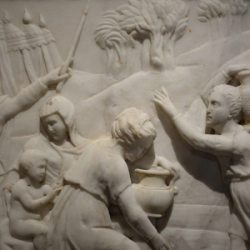While the first account is primarily concerned with the linear unfolding of God's cosmic plan to impose order upon chaos, the second accentuates humanity's links with the earth. It introduces the concept of stewardship. Humans (adam) are formed from humus (adamah). God set us in the garden and told us to work it and watch over it. This is what our dominion actually entails. As the 20th-century German-Jewish scholar Benno Jacob points out, God's commandment to watch over the garden characterizes the land as God's property, not ours. Genesis 2 defines the mandate set forth in the previous chapter. We are guardians of a divine trust. As the psalmist later reminds us, "The earth is the Lord's."
Shabbat: Last in Creation, First in Intention
It is not easy to maintain the proper tension between human dominion and nature's integrity. From the start, God seems to recognize that people will frequently choose to misinterpret their stewardship as license to plunder the natural world. Therefore, immediately after forming humanity, God establishes an essential constraint on our destructive tendencies, the Sabbath. This is the crown of creation, a day on which all forms of work are forbidden.
The rabbis of the Talmud maintained that although the Sabbath was the last thing God created, it was meant to be from the start, "first in intention." These same sages defined the "work" prohibited on the Sabbath as any of thirty-nine types of activity that change the natural order. Once a week then, we are called upon to refrain from all labor that employs the things of nature for the achievement of human ends. The Sabbath is a tangible reminder that the creation is worth more than any monetary considerations.
No wonder Rabbi Abraham Joshua Heschel considered this day the last, best hope of modern women and men who seek a vision of peace with all things in our profane age of clattering commerce. Later in the Torah, the principle of the sabbath day is applied to agricultural policy in the ordinance of the sabbatical year. Every seven years, the farmer is required to let his or her land lie fallow, relying instead upon God's bounty. We moderns tend to see this as an early -- and sound -- policy of soil conservation.
However, it is also one more expression of the proposition that underlies all Jewish environmental ethics: we are only tenants on this earth. The land belongs to God. We are given permission to enjoy the Creator's abundant gifts, but we must not waste or wantonly destroy anything. The Jewish injunction known as bal tashchit teaches us to live lightly, conserving earth's abundance. Indeed, the rabbis declare that anyone who eats a fruit without saying the proper blessing of thanksgiving to God is like a thief, stealing from the Creator.
Conclusion: A Gift to Our Descendants
The creation narrative that opens the Torah has been the source of a steady stream of commentary, as each generation has sought to reinterpret it. We continue to revisit the Garden and explore the relationship with the rest of God's creation. Our final selection is rooted in this tradition. It comes from Koheleth Rabbah, a collection of homilies based on the book of Ecclesiastes. It leaves us with a crucial charge: Preserve this beautiful world for your descendants, for if you fail to do so, there will be no more chances to restore it. When the Blessed Holy One created the first human beings, God took them and led them around all the trees of the garden of Eden and said to them: "Behold My works! See how lovely and commendable they are! Pay heed that you do not corrupt and destroy My universe, for if you do corrupt it, there will be no one to repair it after you."
Daniel B. Fink is Rabbi of Congregation Ahavath Beth Israel, in Boise, Idaho. He received his Bachelor's degree in History and Philosophy from the University of Virginia, and a Masters of Arts in Hebrew Letters from the Hebrew Union College in Cincinnati. He is an ardent environmentalist who enjoys hiking, canoeing, biking, and kayaking. He is coauthor, with Ellen Bernstein, of Let the Earth Teach You Torah (New York: Shomrei Adamah, 1992) and, with Aubrey Rose, Judaism and Ecology (London: Cassell, 1992), as well as numerous articles on Judaism and environmental policy.
This article was originally published in the Forum on Religion and Ecology and in Earth Ethics 10, no.1 (Fall 1998).
Copyright © 1998 Center for Respect of Life and Environment.
Reprinted with permission.




